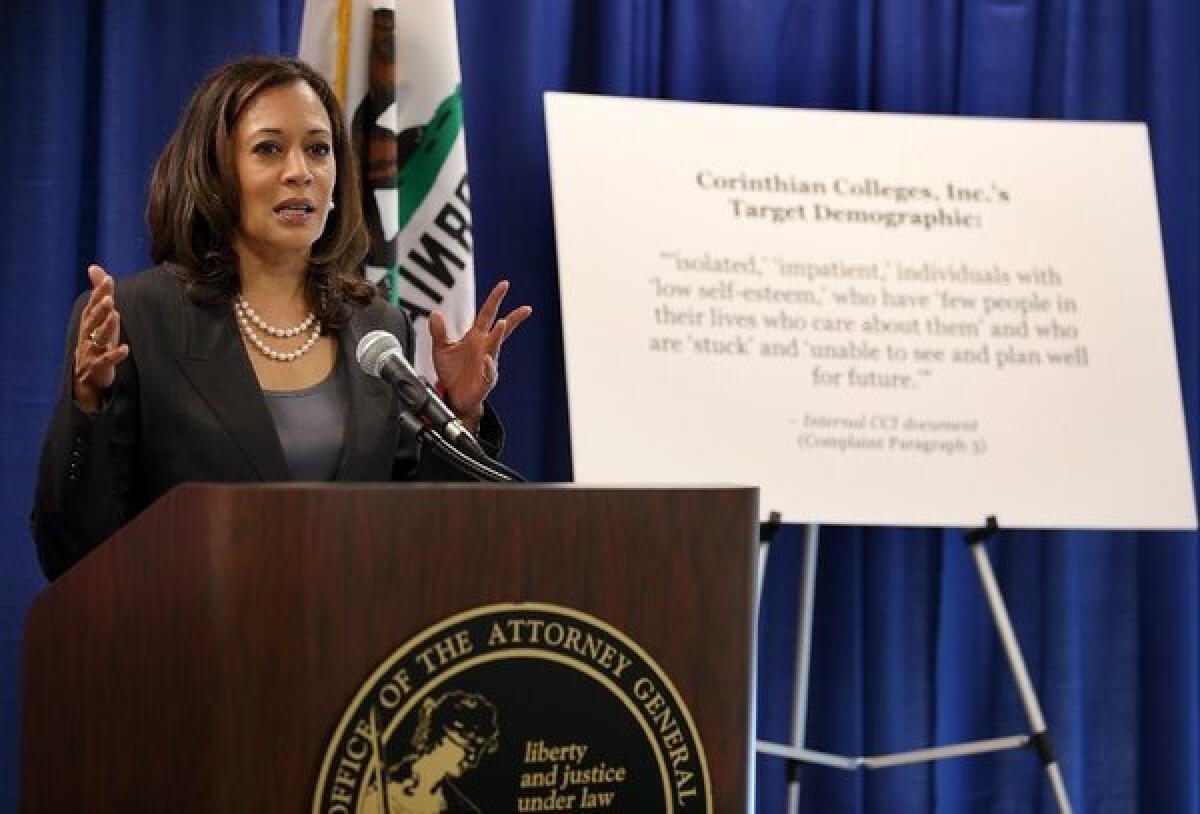Column: SEC gives former execs of Corinthian Colleges, a massive scam, slaps on the wrist

Corinthian Colleges was a higher-education scam that defrauded tens of thousands of low-income students out of as much as $100 million in federally backed loans. Many are still struggling with the consequences because the Trump administration is refusing to grant them full relief from their student debt.
The Securities and Exchange Commission just settled its case against Jack D. Massimino and Robert C. Owen, the leading perpetrators of this deception, for a pittance.
The penalties imposed for their alleged violations of securities laws: $80,000 against Massimino and $20,000 against Owen. Neither had to admit wrongdoing and neither is barred from serving again as an officer or director of another publicly traded company.
The collapse of Corinthian was — and still is — the largest collapse of an institution of higher education in American history.
— Sens. Elizabeth Warren, Richard Blumenthal, Sherrod Brown and Richard Durbin
“Just comparing the slap on the wrist that the executives have gotten from the SEC to the plight of the students is pretty outrageous, both in absolute and relative terms,” says Eileen Connor of the Project on Predatory Student Lending at Harvard Law School, which has been representing many of the students in court.
Santa Ana-based Corinthian filed for bankruptcy protection in 2015 and is now defunct. Massimino, who was the vocational education firm’s chairman and chief executive, was paid $9.6 million in 2011-13; Owen, its chief financial officer, was paid $2.6 million over the same period.
The SEC settlement, which was filed in federal court in Los Angeles on Feb. 25, has caught the eye of Democrats in Congress, who see it as part and parcel of the Trump administration’s bizarrely tolerant approach to for-profit colleges.
Sens. Elizabeth Warren of Massachusetts, Richard Blumenthal of Connecticut, Sherrod Brown of Ohio and Richard Durbin of Illinois wrote Monday to SEC Chairman Jay Clayton demanding an explanation for the weakness of the settlement, calling it “an insult to the victims of Corinthian’s fraud,” including thousands whom the federal government is still pursuing “for debt worth more than the SEC’s fines.” They called the settlement “shocking in its failure to appropriately hold these executives accountable.”
Massimino and Owen could not be reached for comment, and their attorneys did not return calls.
Institutions like Corinthian, which fed on federal loans taken out by their students, were a noxious corner of the higher-education sector until the Obama administration and state attorneys general derailed the gravy train, starting about 2013.
In 2016, then-California Atty. Gen. Kamala Harris obtained a $1.1-billion default judgment against Corinthian for a raft of deceptive practices.
Corinthian, along with several other such operations, was forced to shut down.
The Trump administration, however, has given the industry hugs and kisses while putting the squeeze on its defrauded students.
Under President Obama, the Education Department offered blanket forgiveness of federal student loans taken out by Corinthian students. Its rationale was that Corinthian had systematically inflated job placement statistics for its graduates, which meant students were misled about their employment prospects after graduating.
Critics asserted that Corinthian and other institutions like it preyed on a vulnerable population of low-income students anxious to move into vocational fields by assuring them that they could finance their education with loans and pay them off from higher wages after graduation.
“The collapse of Corinthian was — and still is — the largest collapse of an institution of higher education in American history,” the four senators observed in their letter. “It damaged shareholders, cost taxpayers tens of millions of dollars, and left tens of thousands of Corinthian students with useless college credits and no clear path to continue their education.”
Trump’s Education secretary, Betsy DeVos, cut the loan relief back sharply, by measuring the balance owed on students’ loans against the students’ income using a formula that critics say was faulty and illegal. A federal judge, ruling in a class-action case against DeVos brought by Connor’s group, blocked the department’s action last year, but an appeal brought by the government is pending.
DeVos, meanwhile, installed former executives at for-profit institutions in the highest reaches of her agency.
For instance, she appointed Julian Schmoke Jr. as the Education Department’s chief enforcement officer overseeing investigations into for-profit education scams. Schmoke is a former dean at DeVry Education Group (now known as Adtalem); in 2016, DeVry agreed to a $100-million settlement of Federal Trade Commission charges that it misled students with bogus employment statistics, covering some activities that took place while Schmoke was employed at DeVry.
The Corinthian case isn’t the first in the for-profit education sector in which the SEC has treated alleged perpetrators with kid gloves. In 2017, the SEC staff reached a settlement with ITT Educational Services and two of its top executives the agency had accused of fraud. The settlement with the firm required the executives to pay no penalties or make any admissions; the firm, which was then out of business, paid no fine and made no admission of guilt.
The SEC commissioners, however, rejected the settlement, possibly because Durbin and Brown raised a public stink about it. Last year, the SEC reached a new settlement in which the executives, former CEO Kevin Modany and former CFO Daniel Fitzpatrick, were penalized $200,000 and $100,000, respectively, and barred from serving as officers or directors of public companies for five years. They didn’t admit to or deny the allegations.
The SEC case against Massimino and Owen was something of a sideshow to the main deceptions that Corinthian has been charged with. Rather, it involves the company’s alleged maneuvers to remain eligible for federal student grants and loans, which were its lifeblood.
The company’s eligibility depended on a “composite score” measuring its financial health. To pump its score up over the required threshold, the SEC said, Corinthian inflated its long-term debt by borrowing tens of millions of dollars days before the end of its fiscal year in 2011, 2012 and 2013, then repaying the loans days later, after the next fiscal year began.
The maneuvers made it seem as if Corinthian had much more in the bank at the end of each fiscal year than it really did. Without them, Corinthian’s composite scores would have fallen below the minimum needed to be eligible to receive money from federal student grants and loans.
“Clearly there’s been a change in the view at the SEC about culpability and consequences for these people who extract so much taxpayer money and then harm hundreds of thousands of students,” Connor told me. The Education Department has even started to seize earned income tax credit payments from former students to pay for their student loans, even when they have applications for relief pending, she says.
“It seems that the department will go to the ends of the Earth to squeeze money from these students,” Connor says. “When it comes time to hold people accountable who actually were responsible for this situation, it’s a slap on the wrist.”
Keep up to date with Michael Hiltzik. Follow @hiltzikm on Twitter, see his Facebook page, or email michael.hiltzik@latimes.com.
Return to Michael Hiltzik’s blog.
More to Read
Sign up for Essential California
The most important California stories and recommendations in your inbox every morning.
You may occasionally receive promotional content from the Los Angeles Times.











